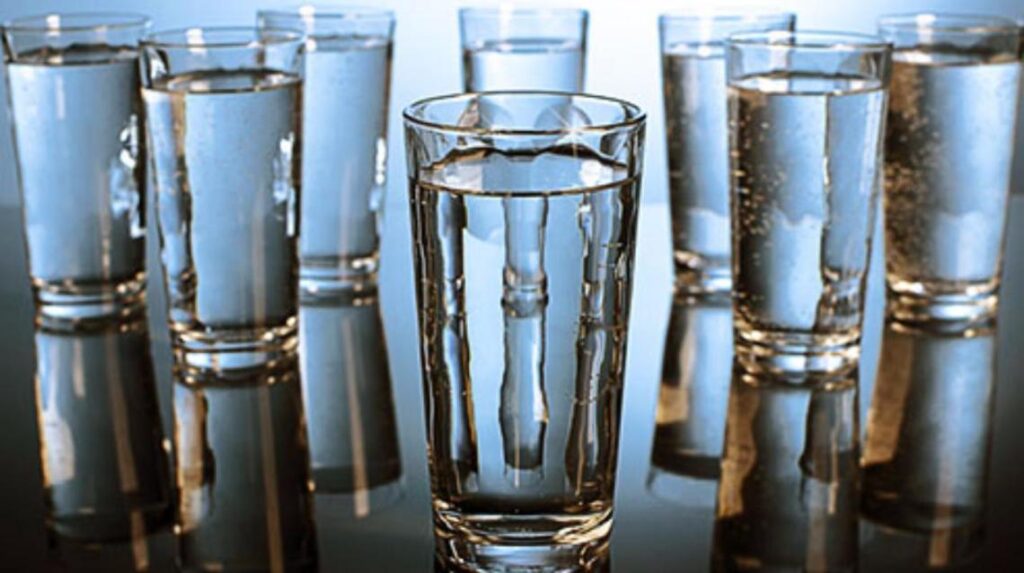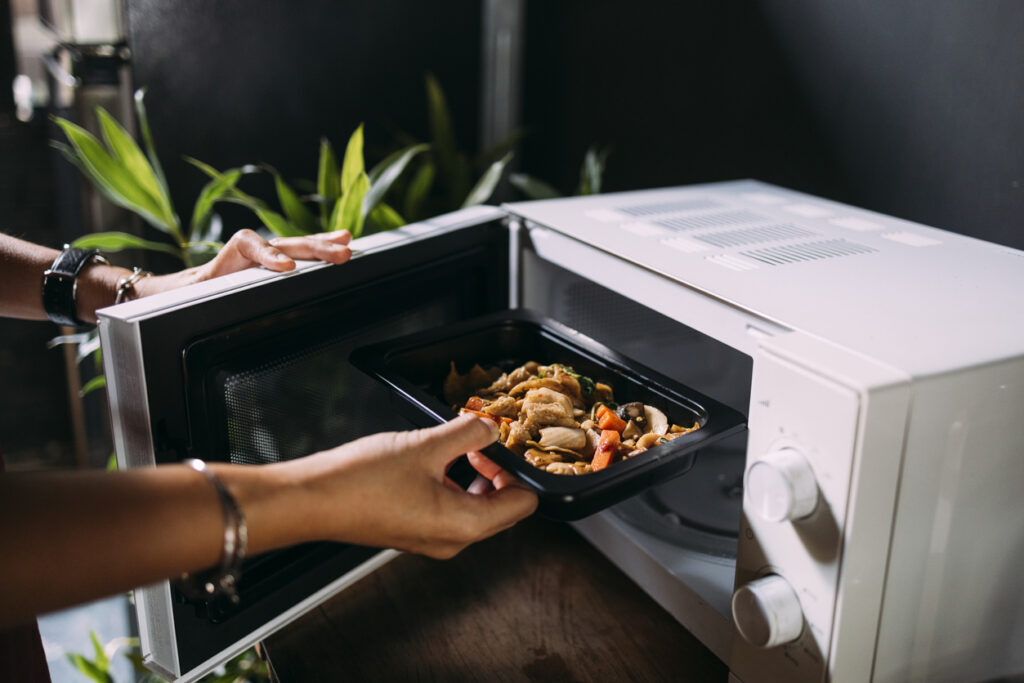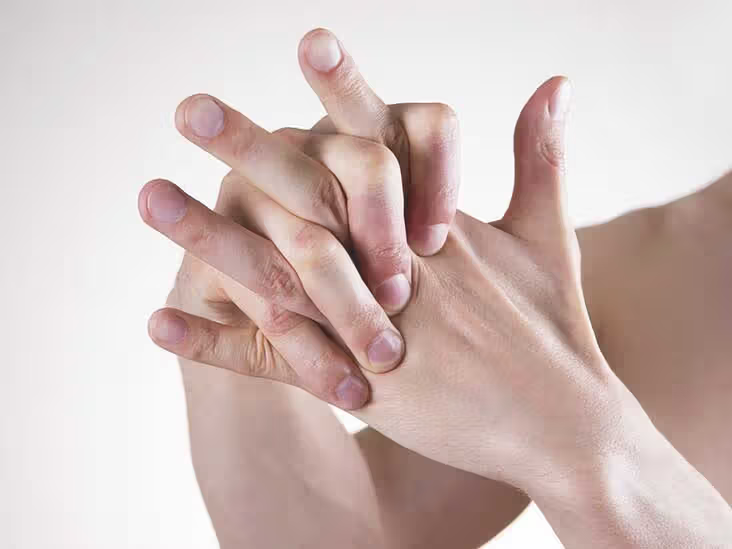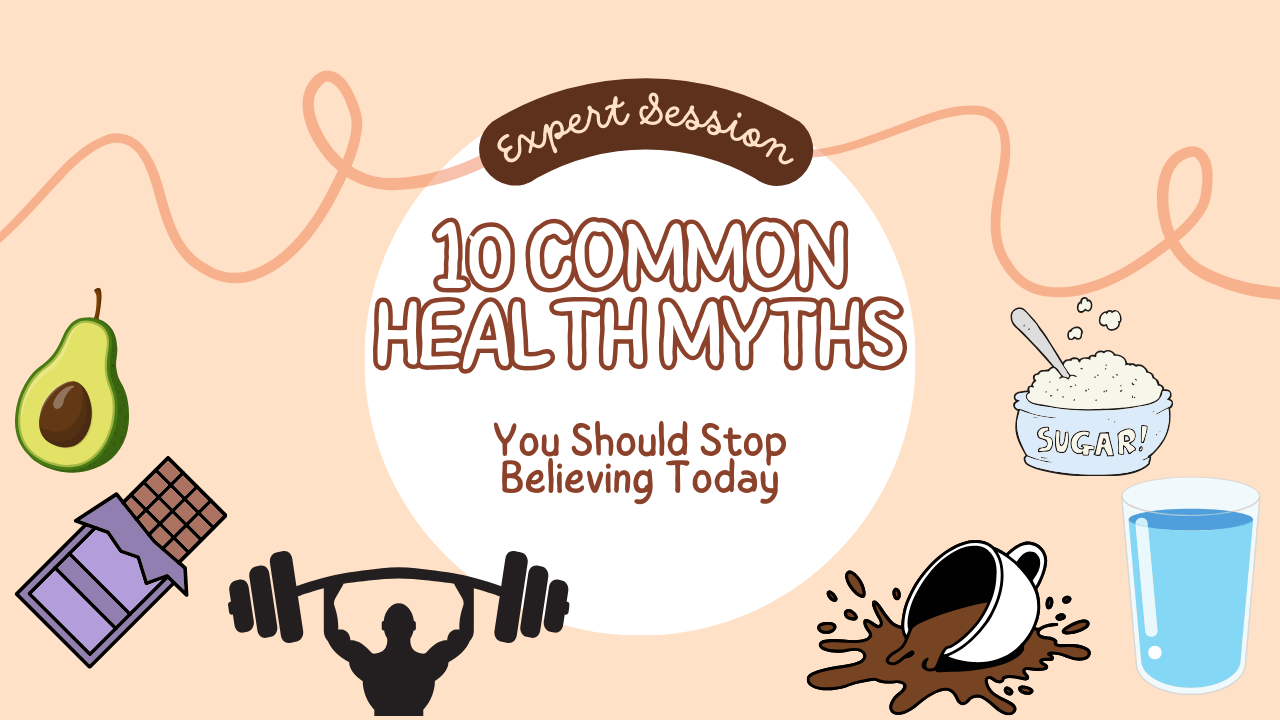When it comes to health, many people rely on tips they’ve heard from friends, family, or social media. While some advice can be helpful, a lot of it is based on outdated beliefs or just plain myths. These health myths can lead to confusion and even harmful habits if people don’t take the time to learn the truth.
Many of these myths sound believable, which is why they spread so easily. For example, you might have heard that you need to drink eight glasses of water every day or that cracking your knuckles causes arthritis. While these claims are common, science tells a different story.
Understanding what’s true and what’s not is important for staying healthy. In this article, we’ll explore 10 popular health myths that people often believe. By learning the facts, you can make better choices for your body and avoid falling for health advice that doesn’t really work.
Myth 1: You Need to Drink 8 Glasses of Water Every Day

This is one of the most common health myths people still believe — that you must drink exactly 8 glasses of water every single day to stay healthy. While it’s true that staying hydrated is important, the idea of a strict 8-glass rule isn’t backed by science. In reality, there is no one-size-fits-all amount of water that everyone must follow.
✅ The Truth:
Every person’s water needs are different. How much water you need depends on several things like your age, how active you are, the weather in your area, and what you eat every day. For example, someone who exercises often or lives in a hot climate will naturally need more water than someone who is less active or lives in a cooler place.
You also get water from many other sources, not just plain water. Foods like fruits, vegetables, soups, and even drinks like tea contribute to your daily water intake. 💡 The best advice is to simply listen to your body — when you feel thirsty, have a drink. That’s your body’s natural way of telling you it needs hydration.
Myth 2: Eating Fat Makes You Fat
For a long time, many people believed that eating fat would automatically lead to weight gain. This idea became so popular that “low-fat” and “fat-free” products started filling grocery store shelves. However, this belief is not completely true. Not all fats are bad for your health. In fact, healthy fats found in foods like nuts, avocados, and olive oil can be good for your body. It’s about choosing the right kinds of fat, not avoiding all fat completely.
✅ The Truth:
- Your body actually needs healthy fats to work properly. These fats give you energy, help your brain function well, and support the health of your cells. They also help your body absorb certain vitamins.
- Healthy fats can be found in foods like nuts, seeds, avocados, olive oil, and fatty fish like salmon. These fats are good for your heart and can help lower bad cholesterol when eaten in the right amounts.
- On the other hand, not all fats are good. Trans fats and too much saturated fat can raise your risk of heart disease and other health problems. It’s best to limit these types of fats in your diet.
💡 Rather than cutting out all fats, focus on choosing healthy fats and enjoy them in proper amounts for better health.
Myth 3: Natural Sugar Is Better Than Added Sugar

Many people think that sugars from sources like honey, fruit juice, or maple syrup are healthier than regular white sugar. However, your body processes all types of sugar in the same way. Whether it’s from natural sources or refined sugar, it still gets broken down into glucose, which can affect your blood sugar levels. While natural sweeteners may contain some additional nutrients, they still contribute to calorie intake and can lead to health issues if consumed in excess.
✅ The Truth:
- Sugar is sugar, whether it comes from honey or white sugar.
- Consuming too much sugar, even from “natural” sources like honey or maple syrup, can still lead to weight gain, diabetes, and other health issues.
- Whole fruits, however, are a better choice because they contain fiber and important nutrients that help your body process sugar more slowly, offering more health benefits than sugary drinks or sweeteners.
💡 Choose whole fruits over fruit juices and keep your sugar intake, from all sources, to a minimum.
Myth 4: Detox Diets Cleanse Your Body
You’ve probably seen ads for “detox teas” or “cleansing juices” that promise to rid your body of toxins. However, your body is already equipped with organs like the liver, kidneys, and intestines that naturally filter out toxins. These products often make exaggerated claims and aren’t necessary for detoxification. A healthy diet, staying hydrated, and regular exercise are much more effective ways to support your body’s natural detox processes without relying on special drinks or teas.
✅ The Truth:
- Your liver and kidneys are designed to naturally detoxify your body, removing toxins and waste through their filtering processes. These organs work efficiently to keep your body clean and healthy without the need for special detox diets or products.
- Most detox diets, however, are not backed by science and can even cause harm in the long run. They may involve extreme fasting or consuming certain foods that aren’t beneficial for your overall health.
- While some detox plans may lead to temporary water weight loss, they don’t help with actual fat loss. Once you rehydrate, the weight usually comes back, making these diets ineffective for sustainable weight management.
💡 Rather than focusing on detoxing, prioritize eating balanced meals, drinking plenty of water, and getting enough sleep to support your body’s natural health.
Myth 5: Microwaves Make Food Unhealthy

Some people believe that microwaving food destroys nutrients or makes it unsafe. However, this is a misconception. Microwaving food is actually a quick and efficient way to heat meals, and it doesn’t remove more nutrients than other cooking methods. In fact, because microwaving cooks food faster, it can help preserve more nutrients compared to methods like boiling, which can cause nutrients to leach out into the water.
✅ The Truth:
- Microwaving heats food by using electromagnetic waves that cause water molecules in the food to vibrate, which generates heat and cooks the food.
- This method is one of the best for preserving nutrients because it cooks food quickly, reducing the time that nutrients are exposed to heat. The shorter cooking time helps retain more vitamins and minerals compared to methods like boiling or frying, where nutrients can be lost in the cooking process.
- As long as you use microwave-safe containers, microwaving is a safe and effective way to prepare food.
💡 Microwaving is a fast and healthy way to cook or reheat your food, helping preserve nutrients while saving time.
Myth 6: Cold Weather Makes You Sick
Many people think that cold weather is what causes them to catch a cold, but that’s a misconception. Colds are actually caused by viruses, not the temperature. While colder weather can make people more likely to stay indoors, where viruses can spread more easily, it’s the viruses themselves that cause the illness. In fact, the real culprit behind a cold is exposure to the virus, not the drop in temperature. So, it’s important to focus on preventing viral exposure, not just staying warm.
✅ The Truth:
- You get sick because of viruses, especially when you’re around others who are already sick. Viruses spread more easily when people are in close contact with each other, such as in crowded spaces or when someone is coughing or sneezing nearby.
- In colder months, people tend to stay indoors more often, which increases the chances of being exposed to these viruses. This close proximity allows viruses to spread quickly in indoor environments, where the air circulation may be limited.
- It’s important to note that cold weather itself does not directly cause illness. The illness comes from being exposed to viruses, not from the temperature.
💡 To stay healthy in winter, make sure to wash your hands regularly, avoid close contact with sick people, and keep yourself warm to support your immune system.
Myth 7: You Only Need Sunscreen on Sunny Days
Many people skip sunscreen when it’s cloudy or cold, thinking the sun’s rays aren’t strong enough to cause harm. However, UV rays can still damage your skin, even on overcast days. In fact, up to 80% of UV rays can pass through clouds, which means your skin is still exposed to potential damage. Protecting your skin with sunscreen, regardless of the weather, is important for preventing sunburn, premature aging, and reducing the risk of skin cancer.
✅ The Truth:
- Up to 80% of UV rays can pass through clouds, meaning that even on cloudy or overcast days, your skin is still exposed to harmful radiation.
- These UV rays can cause various skin issues, including premature aging, sunburn, and an increased risk of skin cancer over time.
- Because UV damage can occur year-round, it’s important to apply sunscreen every day, regardless of the weather or season. Consistent sun protection helps maintain healthy skin and reduce long-term risks.
💡 Make it a habit to wear sunscreen daily, even during winter or on cloudy days, to protect your skin from harmful UV rays.
Myth 8: You Should Wait 30 Minutes After Eating Before Swimming
Parents often warn kids not to swim right after eating, claiming it could cause cramps. However, there’s no strong evidence to support this belief. While it’s true that digestion requires blood flow, there’s no research showing that swimming after a meal leads to serious cramps or health risks. It’s generally safe to swim after eating, though it’s still a good idea to wait a short while to avoid feeling too full or uncomfortable while in the water.
✅ The Truth:
- During digestion, some blood is directed to the stomach to help break down food, but this amount isn’t enough to interfere with muscle function or prevent you from swimming. Your body is capable of digesting food while still allowing your muscles to work normally.
- You may feel a bit full or uncomfortable after eating a large meal, but light swimming should be perfectly safe. If you feel too full, it’s simply a good idea to take it easy and wait a bit before swimming intensely.
💡 It’s fine to swim after eating, just avoid overeating right before engaging in intense physical activity to prevent discomfort.
Myth 9: Cracking Your Knuckles Causes Arthritis

Some people believe that cracking your knuckles can lead to arthritis, but this is a misconception. The cracking sound you hear is simply caused by the release of gas bubbles that form in the synovial fluid of your joints. This process, known as cavitation, is completely harmless. There is no scientific evidence linking knuckle cracking to arthritis or joint damage. While it may be annoying to some, cracking your knuckles doesn’t cause long-term harm to your joints.
✅ The Truth:
- Cracking your knuckles does not cause arthritis, despite the common belief. The sound comes from gas bubbles in the synovial fluid of your joints, which is a natural process and not harmful.
- Some studies have shown no evidence to suggest that knuckle cracking leads to joint damage or increases the risk of arthritis. While it may cause discomfort or irritation to those around you, it doesn’t pose any real danger to your joints or long-term health.
So, while it might be an annoying habit for some, it’s not something to worry about.
💡 Feel free to crack your knuckles—unless it causes pain, it’s completely harmless.
Myth 10: If You Feel Fine, You Don’t Need a Checkup
Many people tend to avoid seeing a doctor unless they feel unwell. However, some health problems don’t show noticeable symptoms until they’ve become more serious or advanced. Regular check-ups can help catch potential issues early, even before symptoms appear. Preventive care allows doctors to detect underlying conditions, such as high blood pressure or early-stage cancer, that could lead to bigger problems if left untreated. Staying proactive with your health can save you from more severe complications in the future.
✅ The Truth:
- Conditions like high blood pressure, diabetes, and high cholesterol often don’t show noticeable symptoms, which means they can go unnoticed for a long time. These issues can silently damage your body, leading to serious complications like heart disease, stroke, or kidney problems.
- Regular checkups with a doctor are essential because they help detect these conditions early, even before symptoms appear. Catching these issues early allows for timely treatment and lifestyle changes to prevent further health problems.
- Remember, prevention is always better than cure. Taking proactive steps to monitor your health through regular visits to the doctor can save you from more serious health concerns down the road.
💡 Even if you feel fine, it’s important to get regular health checkups to catch potential issues early and stay safe.
Conclusion
Health myths are everywhere—on social media, passed down through family advice, and even in old sayings. While these myths may seem harmless, many of them are not true and can lead to poor health choices. It’s important to know the facts to make informed decisions about your well-being.
Here’s a quick recap of the 10 myths we covered:
- You don’t need to drink exactly 8 glasses of water a day. Hydration needs vary based on factors like age, activity level, and climate.
- Fat doesn’t make you fat—unhealthy fats like trans fats are the real culprits. Healthy fats are essential for energy and overall health.
- Natural sugars, like those from honey or fruit juice, can still harm your health if consumed in excess.
- Detox diets aren’t necessary—your liver and kidneys naturally detox your body. There’s no need for special cleanses or detox teas.
- Microwaving food is safe and actually helps preserve nutrients better than other cooking methods, as it cooks food quickly.
- Cold weather doesn’t cause illness—viruses do. While winter may increase indoor gatherings, it’s the viruses that spread, not the temperature.
- Sunscreen is important every day, not just on sunny days. UV rays can still harm your skin on cloudy days or during winter.
- Swimming after eating is safe. The idea that it causes cramps is a myth—just avoid overeating before swimming.
- Cracking your knuckles doesn’t cause arthritis. The sound is from gas bubbles in your joints and is harmless.
- You need regular check ups, even if you feel healthy. Some health issues don’t show symptoms until they’re serious, so early detection is key.
By learning the truth and ignoring these myths, you can make better choices for your health. When in doubt, always check with reliable sources or consult a doctor. Stay informed, stay healthy!
FAQs
- Is drinking 8 glasses of water a day really necessary ?
No, the “8 glasses” rule is a myth. Water needs vary from person to person depending on age, activity, diet, and climate. - Can eating fat actually be good for you ?
Yes, healthy fats like those in avocados, nuts, and olive oil are good for your body and brain. It’s unhealthy fats you should avoid. - Do detox diets really cleanse the body ?
No. Your liver and kidneys naturally detox your body. Most detox diets are unnecessary and can sometimes be harmful. - Is microwave cooking bad for your health ?
No, microwaving is safe and often preserves more nutrients than other cooking methods when used with microwave-safe containers. - Should I still wear sunscreen on cloudy days ?
Yes, up to 80% of UV rays can pass through clouds. Wearing sunscreen daily helps protect your skin from damage and aging.

